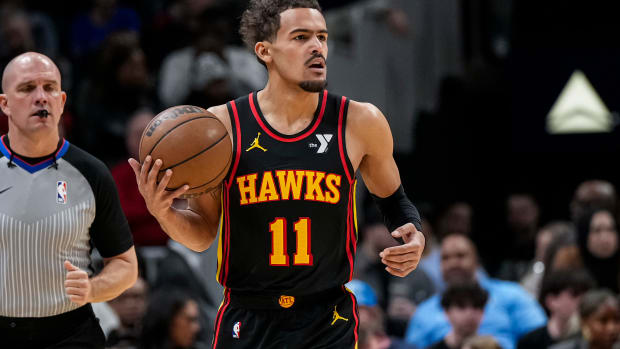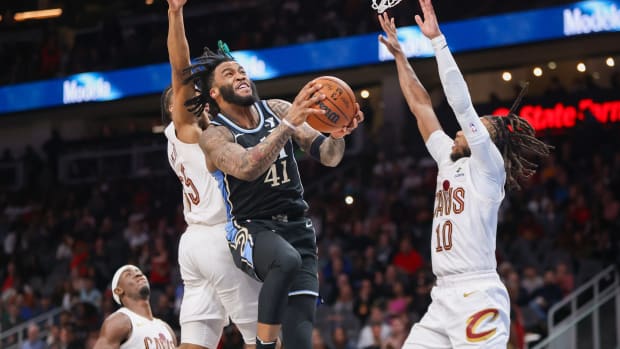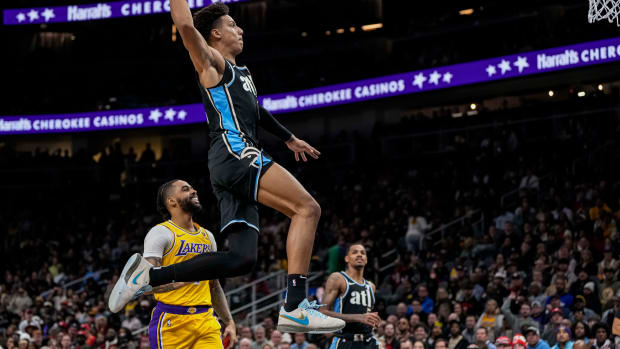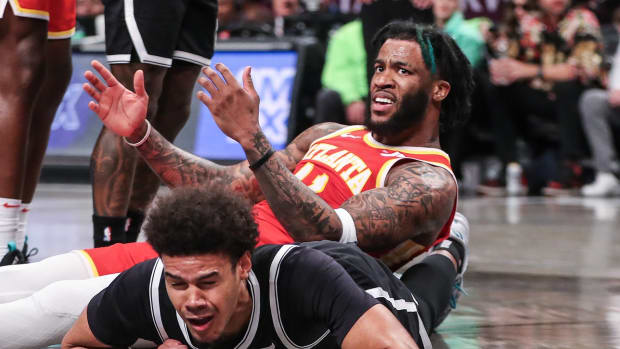Notebook: Young's Passing, Reddish's Defense Stand Out in Win Over Mavs
The Hawks earned their second consecutive win Saturday night against the shorthanded Dallas Mavericks, though it was neither easy nor pretty. The night began ominously for Atlanta, who looked disengaged early, shot 1-of-11 from 3 in the first quarter, and trailed by 14 by the end of one. Dallas, who was missing Luka Dončić and Kristaps Porzingis, was by far the more assertive team, slashing into the lane to create open jumpers and defending with zeal. The Hawks didn’t have an answer on either end of the floor, and looked on track for another blowout loss to a shorthanded iteration of the Mavericks.
The game shifted, however, in the second quarter. Atlanta moved into a zone on defense, which helped unlock both ends of the floor. Cam Reddish had 10 points in the second period, John Collins added 14, and Atlanta was back within striking distance by halftime. After a cold third quarter from both teams, the Hawks hit their stride in the fourth quarter, outscoring Dallas 34-21 over the final 12 minutes while shooting 56 percent from the field.
Atlanta made a 15-2 run between the 10:08 and 6:33 marks of the fourth quarter, and didn’t take its first lead of the game until Dewayne Dedmon put back Trae Young’ s missed layup with 5:24 to play. The Hawks allowed just 41 points in the second half, held Dallas to 1.06 points per possession for the game, and noticeably improved their defense as the game progressed.
“I thought our guys did a tremendous job in the second half defensively,” Lloyd Pierce said. “That’s the main focus, is trying to guard, keep the ball out of the paint, and then make teams have to shoot over our defense, not through our defense.”
Collins delivered one of the best performances of his career, scoring 35 points and grabbing 17 rebounds. Young settled into the game after a slow start, and while Kevin Huerter (1-for-11 from the field) struggled offensively, his defense and playmaking were important contributions to the win. Even Treveon Graham and Bruno Fernando played surprisingly heavy minutes off the bench.
The Hawks weren’t perfect, but, in contrast to some of their uglier losses early in the year, hung around long enough to find a way to win. Let’s parse through some of the good and the bad from Saturday’s win.
Trae Young didn’t have his best passing game
Any criticism of Young comes with the implicit acknowledgement that he is held to a higher standard than most. His 25 points and 10 assists on Saturday would represent high-water marks for a lot of NBA players, but read as a rather pedestrian showing from an All-Star.
With that in mind, Young's decision-making wasn’t quite as quick as usual in the face of a fairly aggressive defensive scheme from the Mavs. Dallas employed hard traps on Young in the pick-and-roll that the Hawks struggled to solve, which not only prevented Young from scoring but impeded Atlanta’s ball movement. Young had two turnovers and just one assist as the Hawks scored only 0.72 points per possession in the first quarter, and he couldn’t step into his usual pull-up 3s with multiple defenders tailing him. He held onto the ball too long against double-teams and missed pressure-release options, which allowed Dallas to push the ball further from the rim and recover more easily when Young finally got rid of the ball.
Deciding when to hold onto the ball and and when to off of it quickly is a delicate balance for Young to strike. Part of what makes him such an effective and creative playmaker is his ability to probe until an opening forms and deliver passes where opponents don’t expect them. Often, he creates greater advantages by pulling the defense with him as he dribbles, then finding the open man. “I know a lot of teams are gonna come out and trap me, try and get the ball out of my hands,” he said. “It’s my job to get the ball out quickly or drag the defense out and let [my teammates] play four-on-three on the back side.”
But there are also times when he’s better served getting rid of the ball earlier, trusting his teammates to keep the ball moving and find an open shot. The longer he waits, the easier the defense can rotate and close off other avenues through which the offense might run. It’s incumbent upon the other Hawks on the floor to make themselves available as release valves, but Young didn’t always hit them on Saturday; Kevin Huerter did not look psyched early in the game after standing on the weak side with his arms up and a no defender near him and not receiving the ball.
It wasn’t until the fourth quarter, when the Mavs dialed back their trapping, that Young’s game -- and by extension, Atlanta’s offense -- truly opened up. Young had just 12 points through the first three quarters, but once Atlanta’s bigs got a handful of easy looks at the rim, Dallas could no longer send such aggressive double-teams. Young found himself with room to shoot, favorable one-on-one matchups, and more direct passing lanes to the rim than before, and he took full advantage. He shot 3-of-5 from 3-point range on his way to 13 points and four assists in the quarter, and was able to get into the lane more easily than he had all game.
“They stopped trapping so hard and I was able to get into my rhythm, get downhill, get some floaters, get some layups to go,” Young said. “And then obviously late in the fourth I was able to get my shot going.”
Teams have been more wary of blitzing Young since Collins returned from suspension and Huerter returned to full health; the Hawks now have the weapons to capitalize on four-on-three situations in a way they couldn’t earlier in the year. Saturday was the first time in a while that an opponent has trapped Young outright from the jump. It’s a tactic more teams could go back to given how dangerous Young was after the Mavs loosened up their pressure.
Atlanta’s zone changed the game’s complexion
After allowing 35 points and five 3-pointers in the first quarter, Atlanta shifted to a zone on defense. Almost instantaneously, the Hawks began to climb back into the game, using their heightened activity level to speed up the Mavericks and fuel their own transition attack. At first glance, that activity could easily have been mistaken for confusion. Atlanta’s defenders scrambled around the floor to close out on shooters, rotate into the paint, close passing lanes, and stay in front of the ball, constantly teetering on the edge of a breakdown.
Relative to their defensive effort in the first quarter, that still represented a vast improvement. Atlanta couldn’t contain the ball early in the game, which led to continual layups and drive-and-kick 3s for the Mavs. Pierce felt he had to try a different look, even if it still left his team somewhat vulnerable.
“Their small-ball lineup really exposed us in a lot of ways,” he said. “The zone was really just to prevent the penetration and I thought we did a good job of it. We gave them different looks and threw them off a little bit.”
Part of the Hawks’ struggles early in the contest -- and thus, the need to switch to the zone -- was Young’s utter ineffectiveness on defense. Even for one of the worst defenders in the NBA, his first-half performance stood out for its lack of agility and physicality. He was knocked aside by every Maverick guard to ventured to drive and wasn’t particularly disruptive away from the ball, either. The zone was one of the only ways to mask him, and to his credit, he was a serviceable link in the chain.
On a few possessions Dallas moved the ball well enough against the zone to generate quality looks, and the Hawks were probably fortunate to give up only 31 points in the quarter. But the zone was just effective enough to give Atlanta the jolt it needed and keep the Mavs at bay during an explosive offensive quarter. The Hawks scored 37 points and shot 70 percent from the field during the second period, and rattled off a 14-4 run late in the quarter to trim Dallas’ lead to eight before halftime.
Reddish was instrumental in turning the game on both ends of the floor during that stretch, spearheading Atlanta’s defense with his length at the top of the zone and attacking the basket at every opportunity. He finished the game with 20 points despite missing all six of his 3-point attempts, and was at the forefront of the Hawks’ best stretches of the game. “His mentality was tremendous,” Pierce said. “I love his attack mentality and we needed it in that second quarter because we were struggling to score.”
In addition to his aggressive scoring, Reddish helped force miscues by Dallas without which Atlanta could not have won. Saturday was his eight game with at least three steals, he had six deflections, and, as he did in Thursday’s win, used his quick hands to create an open-court dunk late in the game. With De’Andre Hunter unavailable, the Hawks needed everything Reddish gave them in his 39 minutes, and he brings more to the table than ever.
Dewayne Dedmon, a little jumpy on defense
Dedmon hasn’t been as effective as anticipated on defense and only played 25 minutes on Saturday night, largely because of his inability to stay on the floor. The center has battled foul trouble in all but one of his five games since returning to Atlanta, which mitigates not only his availability but his otherwise positive defensive impact. He tends to swatting his arms around the rim rather than simply making opponents shoot over his length, which needlessly adds to his foul count. He’ll get caught reaching for the ball as players approach him going downhill, and he’ll occasionally chase blocks that leave his man unchecked on the offensive glass:
At his best, Dedmon is an effective deterrent inside and capable switch defender on the perimeter. Twice he stayed in front of Tim Hardaway Jr. after a switch in Saturday’s game and forced difficult shots (though Hardaway banked in a 3-pointer over him on one of those possessions). He rebounds quite well and his communication from the back line helps tie Atlanta’s defense together in a way it wasn’t before he arrived. Now he must find a way to keep all of that on the floor.





